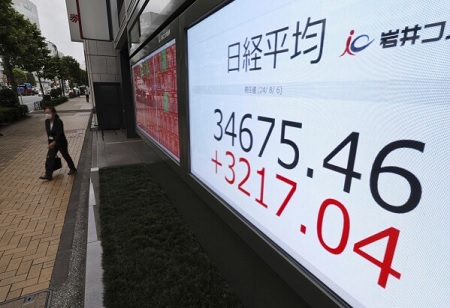
Japanese Stocks Rally After Global Downturn, U.S. Futures Edge Up

 Japanese shares bounced back early, recovering from a historic sell-off on Monday and surpassing modest gains seen in other parts of Asia. U.S. equity futures also saw an uptick in early Asia trading. Japan’s benchmark Nikkei 225 index surged as much as 10 percent in early trading and was up 9.4 percent at 34,416.32 by the midday break, following its largest single-day point drop ever recorded on Monday. Futures linked to the broader S&P 500 were up approximately 1.5 percent.
Japanese shares bounced back early, recovering from a historic sell-off on Monday and surpassing modest gains seen in other parts of Asia. U.S. equity futures also saw an uptick in early Asia trading. Japan’s benchmark Nikkei 225 index surged as much as 10 percent in early trading and was up 9.4 percent at 34,416.32 by the midday break, following its largest single-day point drop ever recorded on Monday. Futures linked to the broader S&P 500 were up approximately 1.5 percent.
Japanese Finance Minister Shunichi Suzuki said that the government will continue to monitor financial markets, working closely with the country’s central bank. “The impact of the Bank of Japan’s policy shift on interest rates, public finances and the economy must be carefully monitored”, Suzuki told a meeting of finance officials. “We will calmly assess the current situation and take all possible measures to manage the economy and finance while cooperating with the Bank of Japan”.
Across Asia, Hong Kong’s Hang Seng Index increased by 0.16 percent, and the Shanghai Composite Index rose by 0.19 percent. South Korea’s Kospi index saw a gain of over 3 percent. In Australia, the benchmark S&P/ASX 200 climbed 0.3 percent to 7,668.3 by midday local time, ahead of the country’s central bank interest rate decision. Japan’s index hit record highs above 42,000 in July, but those gains have since been reversed due to concerns about rising interest rates, which are strengthening the yen and raising investor fears that positions based on a weak yen might be at risk of being unwound.
In recent years, a popular trading strategy has involved borrowing the weak Japanese yen at near-zero interest rates to invest in high-yielding assets in other markets, such as U.S. tech stocks. The market turmoil spread globally, with Wall Street experiencing some of its most volatile trading in years as investors reacted to disappointing U.S. economic data, including a weaker-than-expected jobs report last week. The Dow Jones Industrial Average dropped nearly 1,034 points, or 2.6 percent, closing at 38,703.27. The broader S&P 500 fell by 3.0 percent, while the tech-heavy Nasdaq composite index declined by 3.4 percent.
Analysts at BMI, a unit of Fitch, described the market volatility as a “perfect storm of macro and market shocks at a time when risk assets were already overbought and overstretched”. The Bank of Japan’s decision to raise its short-term policy rate to 0.25 percent on July 31 led to the “unwind of the yen carry trade, which added downside pressure on risk assets which were already selling off”, the analysts said in a research note. They added that disappointing U.S. manufacturing and jobs data and rising geopolitical risks in the Middle East added to the uncertainty.

